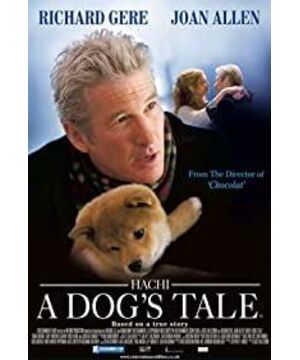The film is based on real events in Japan: an Akita dog stayed at the station for 12 consecutive years after the owner died, waiting for him to return home. To this day, there is still a bronze statue of the dog Hachiko at Shibuya Station in Tokyo, and its remains are also preserved by the National Ueno Science Museum. In the 1990s, Japan once put this theme on the screen with great success, and the effect of tearing was first-rate. Two years ago, Americans remade this drama, starring Richard Gere, the old drama bone, and the place of the story was changed to the United States accordingly. However, I'm more interested in the narrative style of the film, because it's easy to be emotional, but it's hard to be clever. Don't you see that many domestic film and television dramas are desperately trying to impress the audience, and the actors are also doing their best to perform, sometimes shouting piercingly, sometimes crying like a stream of tears, but except for a few emotionally vulnerable aunts and aunts who wipe a few tears, Most people are still indifferent, even when the actors are crying on the screen, the audience in the theater is laughing. Touching people's hearts, sometimes "moisturizing things in silence" is more effective, especially for such a warm subject. The one-and-a-half-hour film is divided into three parts: the first part is about the professor picking up the dog, and his wife strongly opposed to the adoption, but in the end his love for the dog moved her; the second part is about the little eight growing up and developing After the habit of going to the station to pick up the professor to and from get off work every day, one day he suddenly learned the game of picking balls that he had always refused, but after that day, the professor never came back; the third part is that after the professor died, Hachi was unwilling to be with the professor's daughter. Living as a family, rushing back to the station for a long distance, sleeping in the wind, and waiting for the professor to come back every day. Except for some dramatic conflicts in the first part, the other two parts are relatively bland. If it is an ordinary elementary school student writing an essay, it is estimated that one or two hundred words will be finished, but now it has been turned into a movie of more than an hour, which makes people have to I admire the Japanese screenwriter's ability to express ordinary life (the American version still uses the Japanese version of the script 22 years ago). Of course, the American localization of the script is also quite successful. For example, in the Japanese version, there is a scene where Xiaoba wailed at the portrait of the professor and ran with the professor's coffin, which was quite impactful, but these were not in line with the national conditions of the United States, so the American version designed the plot of picking the ball: Xiaobagang When he arrived at the professor's house, he taught it to pick the ball, and even crawled around on the ground with the ball in his mouth (it was this scene that moved the professor's wife), and showed it to him, but who knows that this American-style life is not Japanese. The dog's nature, Xiao Ba has always been unable to learn; after that, the professor's hairy-footed son-in-law came to the door, and in order to get close to the prospective father-in-law's pet, he played the game of picking the ball again. As a result, the dog was indifferent, and the embarrassed young man had to go by himself. Picking up the ball, I tripped and fell in the panic On the morning of the professor's death, Hachi seemed to have a foreboding, chased to the station with the ball in his mouth, and unexpectedly showed the skill of two-stroke picking the ball, which made the professor very happy. In this way, through the core prop of "ball", the three parts are effectively penetrated. The part of Xiao Ba's death was well preserved by the American version: in the wind and snow, Xiao Ba, who was dying, saw the gate of the station open in a trance, and the professor called his name with a smile on his face. It seemed like he was back in the past and rushed towards the professor's arms quickly, but in reality, the old little eight was lying on the ground in the snow and slowly closed his eyes... It's very difficult to make a movie with an animal as the protagonist. There are few attempts, except that animal actors are more difficult to control, how to see the truth in subtleties is also a test of skill. Taking this story as an example, it is impossible to have any ups and downs in daily dog raising. Most of them are trivial things. It is already difficult for the audience to watch it interestingly and not get bored. This point of dog interaction is also lost. It is easier said than done to show a dog's waiting day after day, but also to move people! The efforts of American and Japanese filmmakers in this regard are quite meaningful.
View more about Hachi: A Dog's Tale reviews











